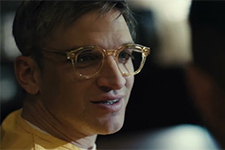Henry Johnson
|  It has been 12 years since playwright-turned-filmmaker David Mamet wrote and directed a feature film. During those years he has remained extremely active in the theatre, writing five plays (at least one of which he also directed) while also making himself into a political lightning rod with his increasingly conservative rhetoric, beginning with an essay in 2011 in which he renounced his previous life as a “brain-dead liberal,” and culminating with repeated proclamations that Donald Trump is the best President since Abraham Lincoln. His extreme rightward lurch has rankled many, but, of course, that is the point, as it fits right into Mamet’s lifelong contrarian ethos and refusal to go along with anything that smacks of received wisdom (as the duplicitous salesman Ricky Roma states so plainly in the 1992 film adaptation of Mamet’s Pulitzer Price-winning play Glengarry Glen Ross, “I subscribe to the law of contrary public opinion: If everyone thinks one thing, then I say bet the other way”). Thus, it is not surprising that Mamet would choose to go against the grain by adapting his most recent play, Henry Johnson, as his first film since the made-for-television movie Phil Spector (2013). The only other time Mamet has directed a film version of one of his own was plays was Oleanna (1994), a divisive battle-of-the-sexes drama adapted from a 1992 play he wrote in the wake of the contentious Clarence Thomas hearings. While the majority of the films Mamet has directed over the years have been almost self-consciously cinematic, Henry Johnson (like Oleanna) is almost purposefully theatrical—limited to three interior locations, stripped down to a handful of characters, and devoid of virtually any action outside of dialogue. However, Mamet and cinematographer Sing Howe Yam, who has worked primarily in music videos until recent years, have done everything they can to avoid a sense of canned theater, drawing us into the spaces with strong close-ups and framings that emphasize extreme foreground and background. Yet, for all that work, Henry Johnson feels cramped and stagey, which at times works to its benefit and at other times overemphasizes its inherent falsity. It is in many ways classic Mamet in the way it pits various characters against each other psychologically, philosophically, and morally, with his trademark dialogue used as both weapon and shield, depending on the character wielding it. They dodge and parry and stab and sometimes cut, deeply in fact, and there are moments of rhetorical power that grab and shake you. But, just as often, if not more, we sense the gifted writer behind the characters, filling them with words and setting them against each other. It doesn’t help that the main character, the Henry Johnson of the title, is a kind of blank slate waiting to be written on by the other characters, which puts the actor who plays him, Evan Jonigkeit (who happens to be Mamet’s son-in-law), in the unenviable position of being constantly on the defensive. The film begins in a wood-paneled office at what we imagine is a high-powered law firm, where Henry is called in by a senior partner, Mr. Barnes (Chris Bauer), to discuss the request Henry has made that he hire an old college friend who has recently been released from prison. As with many of Mamet’s best scenes, we have to glean bit and pieces of information and assemble them into a full picture of what has happened and what is at stake, and by the time we get to the end of the conversation (that is actually an interrogation), Henry, who seems so innocuous and bland with his glasses, trim beard, and soft demeanor, has been revealed to be a criminal himself. We then cut to the next scene, which unfolds within the confines of the prison cell where Henry will be spending the next portion of his life in an orange jumpsuit and the prison library. His cellmate, Gene (Shia LaBeouf), is a mercurial criminal-philosopher who immediately senses Henry’s essentially weak nature and begins plying him with questions and scenarios about life, ethics, morality—all the big topics that animate Mamet’s art and speak to the brutal divides we raise among ourselves in a vicious, competitive society (Gene, who is brilliantly and powerfully played by LaBeouf, would fit right in with Glengarry’s salesmen if you gave him a suit). I won’t say much about the third scene, which also takes place in the prison library, because it marks a dramatic shift in tone and action from the previous two scenes. But, suffice it to say that it once again pits Henry against another character, this time a prison guard named Jerry (Dominic Hoffman), who has a world-weary, no-nonsense perspective of life that contrasts with Henry’s having taken on a more active, violent persona that feels like an ill-fitting suit. Unlike Gene, whose harsh words and predatory nature fit him like a second skin, Henry is out of his league, out of his element, the perpetual prey being played again even though for a long while he is holding a gun. (The fact that Mamet titled the play after this character—whose name is as generic as John Smith—suggests that perhaps he views Henry as the fundamental human condition, weak and pliable and vulnerable to manipulation and deceit. And what are we to make of the fact that Henry wears the same kind of glasses that Mamet is often seen wearing?) The neatness of Mamet’s structure—four scenes, three locations, three characters preying on Henry for three different reasons—gives the film a tightness that doesn’t always work in its favor. The dialogue is, of course, powerful at times, and the performances are mostly exceptional: Chris Bauer is a veteran of Mamet’s stage productions and knows exactly how to play a character who cuts with words, but never betrays his hand; Dominic Hoffman embodies an exasperated, but still controlled sense of existential dread; and LaBeouf, as noted earlier, is potent, evincing an almost hypnotic power in his steely, bracing confidence (it is here that you can really feel Mamet’s direction, as LaBeouf, at least in recent years, has been allowed to run off the rails in many of his performances). Yet, it also feels contrived to the point of distraction. Mamet is a master of engineering situations that allow his characters to be pitted against each other, but in his best works they feel natural (or at least not distracting). In Henry Johnson, Mamet is never able to fully transcend the nature of the adaptation itself, rendering it, if not inert, at least stiff and not entirely convincing. Note: Henry Johnson is available for rental directly through its website: https://henryjohnsonmovie.com. Copyright © 2025 James Kendrick Thoughts? E-mail James Kendrick All images copyright © 1993 |
Overall Rating: 

 (2.5)
(2.5)


